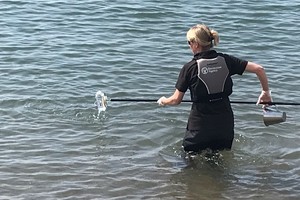Consultation launched to support sustainable fishing of non-quota fish stocks
The Government has today launched a consultation to gather evidence on the impact of flyseining in English waters to support sustainable fishing and reduce pressure on fish stocks.
Flyseining, also known as flyshooting or demersal seining, is a fishing method involving long weighted ropes to herd fish into the mouth of the trawl to target demersal species which live or feed on or near the sea bed, such as red mullet, gurnards and squid. Many of these fish are non-quota stocks (NQS) meaning there is no limit on how many can be fished.
The practice has been around for decades but recently larger flyseining vessels, belonging to a number of different countries, are now operating in the English Exclusive Economic Zone (EEZ) with double the gross tonnage, engine power and vessel length of traditional vessels.
Parts of the fishing industry and environmental organisations have raised concerns about the impact on fish stocks, particularly those on which we currently only have limited data. Measures under consideration include restricting the number of vessels with flyseining gear, the power of their engines and placing limits on the fishing gear.
Fisheries Minister Victoria Prentis said:
“We want our fishing industry to thrive for generations to come and we must ensure our stocks are sustainably managed.
“That’s why we are consulting on potential measures to mitigate the impacts of flyseining on non-quota stocks. I encourage all those from the catching sector and wider fishing industry to share their views”.
Through the Fisheries Act 2020, the UK Government has identified a number of potential measures that could be applied to the fishing of non-quota stocks in English waters to safeguard the future sustainability of these species. Proposals for this consultation include:
- Introducing an ‘entitlement’ which would restrict the number of vessels with flyseining gear (0-200 nautical mile zone); and/or
- Restricting engine power for demersal seine gears to 221kW or 600kw in 0-12 nm zone; and/or
- Removing an exemption that currently allows a 40mm mesh size in a directed squid fishery (0-200nm); and/or
- Restricting vessels’ rope diameter used in flyseine gear to 30-40mm (0-200nm); and/or
- Restricting vessels’ rope length used in flyseine gear to 1500m if in 0-12nm and/or 3000-3200m if in 12-200nm.
This consultation complements work to develop a Fisheries Management Plan for demersal non-quota species in the Channel, and will also look at longer term management approaches for a number of the species targeted by larger flyseine vessels.
The consultation will run for 12 weeks from 25 August until 17 November 2022. Further engagement with industry will take place to implement any measures if taken forward. As this is a devolved matter, any decisions made as a result of this consultation will apply to English waters only.

